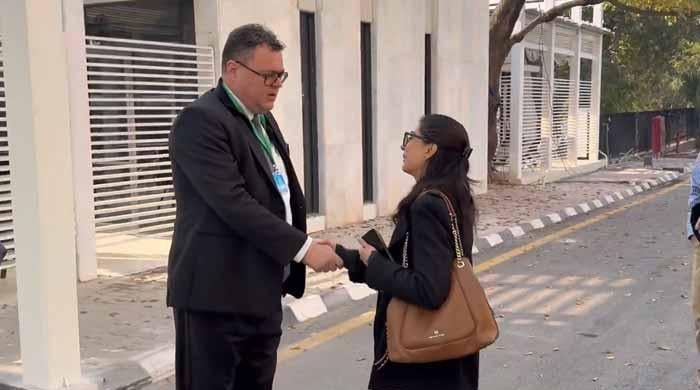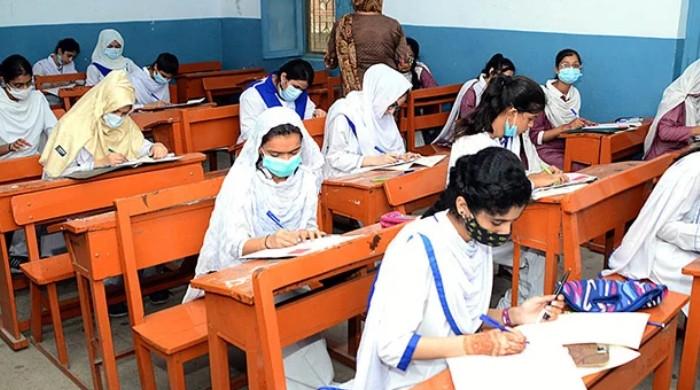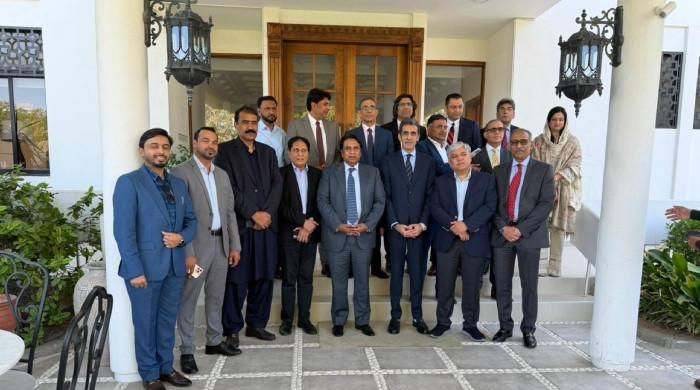Govt issues guidelines for Eid-ul-Azha to avert spread of COVID-19
People urged to minimise travel during Eid as it is likely to fall in the peak period of the COVID-19 outbreak in Pakistan
July 10, 2020

The government on Friday issued detailed guidelines for mitigation of person-to-person transmission of COVID-19 during the period of Eid-ul-Azha — a time when a surge of cases is expected if precautionary measures are not ensured.
According to the official document, directions are issued for the general public, buyers or sellers of animals, and local administration, regarding social distancing, slaughter of animals, and Eid prayers.
The authorities have strictly instructed people to minimise travel during the Eid holidays as it is likely to fall in the peak period of the COVID-19 outbreak in Pakistan.
"Social visits at Eid and general family get-togethers should be avoided. Eid shopping should only be restricted to minimal essentials and crowding in markets is not advisable. The tradition of Eid embracing is likely to increase transmission so it should be avoided this Eid," read the official document.
Social distancing at animal markets
The authorities have issued specific guidelines for social distancing at animal markets for local authorities, animal vendors/sellers, and customers who will be visiting markets for purchasing animals.
Local authorities:
- The local authorities should encourage the trend of online buying, e-selling, and slaughter arrangements of the animals as much as possible in their cities/towns.
- The authorities should allocate large enough spaces, away from generally populated areas, for animal markets.
- The local authorities must get the markets set up under their supervision and allocate space only to vendors strictly following physical/social distancing principals.
- The local authorities must ensure that every individual visiting the market (buyer/seller) must wear a face mask as per the government’s orders. Those without face masks must not be allowed within the market.
- The local authorities must ensure the availability of thermal guns at the market entrance and allow in customers only after checking the temperature.
- The local authorities must designate an individual at the entrance and exit of the market with alcohol-based hand sanitiser (at least 70% alcohol) who must make sure each customer sanitises his hand before entering and while leaving the market.
- Do not allow any customer with cough and flu to enter the markets.
Animal vendors:
- Every seller must wear a face mask as per the government’s order.
- The seller should wash hands with soap and water frequently or use a 70% alcohol-based hand sanitiser.
- The sellers should set up their stalls with a distance of at least 2 metres between each other while having adequate space for their own animals. The supporting arrangements must be made by the local authority.
- Sellers and customers should maintain a safe distance of 2 metres between each other.
- Sellers and customers must not shake hands or initiate any other physical contact.
- The seller must keep a disinfection formula with 0.5% diluted bleach or 60%-80% dilute alcohol solution to disinfect the most frequently used surfaces by the customers.
- Each salesperson must ensure the use of gloves for touching the animals.
Customers:
- The buyer must wear a surgical/medical mask as per the government orders.
- Do not go to the market if you are suffering from fever, cough, or flu.
- Make sure you sanitise your hands before and after visiting the market.
- Do not touch animals without gloves.
- Avoid unnecessary touching of surfaces in the market.
- Maintain a 2-metre distance from a salesperson or another customer within the market.
- Follow the safety guidance provided by the local management and cooperate with the staff.
- If you observe no compliance with the guidelines by the seller, play your role as a responsible citizen and inform the local authorities.
Slaughter of animals
The authorities have also issued general guidelines for the slaughtering of animals.
- The site of slaughtering should be away from the general public and residential areas.
- Crowding while slaughtering should be avoided; only necessary persons should be allowed to be present at the site.
- Practice physical distancing. Maintain a minimum 2-metre distance.
- Promote good respiratory hygiene. Cough or sneeze into bent elbows. Otherwise, a disposable tissue should be used to cover the mouth and nose when coughing or sneezing, then thrown in a bin with a lid. Sanitise your hands after disposal.
- Avoid touching the eyes, nose or mouth, especially when hands are not clean.
- Use gloves and masks. PPE provides a barrier to protect the person from potential exposure to hazards.
- Wash your hands frequently with soap and water for 40-60 seconds. If soap and water are not available, rub your hands for 20-30 seconds with an alcohol-based hand sanitiser that contains 60-80% alcohol.
General preventive measures for Eid prayers
- Separate entrances and exits should be made in a one-way system to prevent bottlenecks.
- Thermal screening for all worshippers at entry points of Eidgah must be made mandatory.
- Hand sanitiser should be available at entrances/exits. Make it mandatory for all people to use it before entering and while exiting.
- Every person should wear a face/surgical mask.
- Mark out prayer spaces clearly using measuring instruments to make social distancing of 6 feet easy to follow.
- Worshippers should bring their own prayer mat (musalla).
- Encourage people to perform wudhu at home.
- People must maintain social distancing by a keeping 2-metre distance between one another, and every other row should be left empty to allow for 2-metre spacing in all directions.
- Discourage the sick and elderly and children under 15 years of age from attending prayers.
- Discourage socialising and embracing within the Eidgah after prayers.
- Allocate a COVID-19 safety officer on both the male and female sides.









